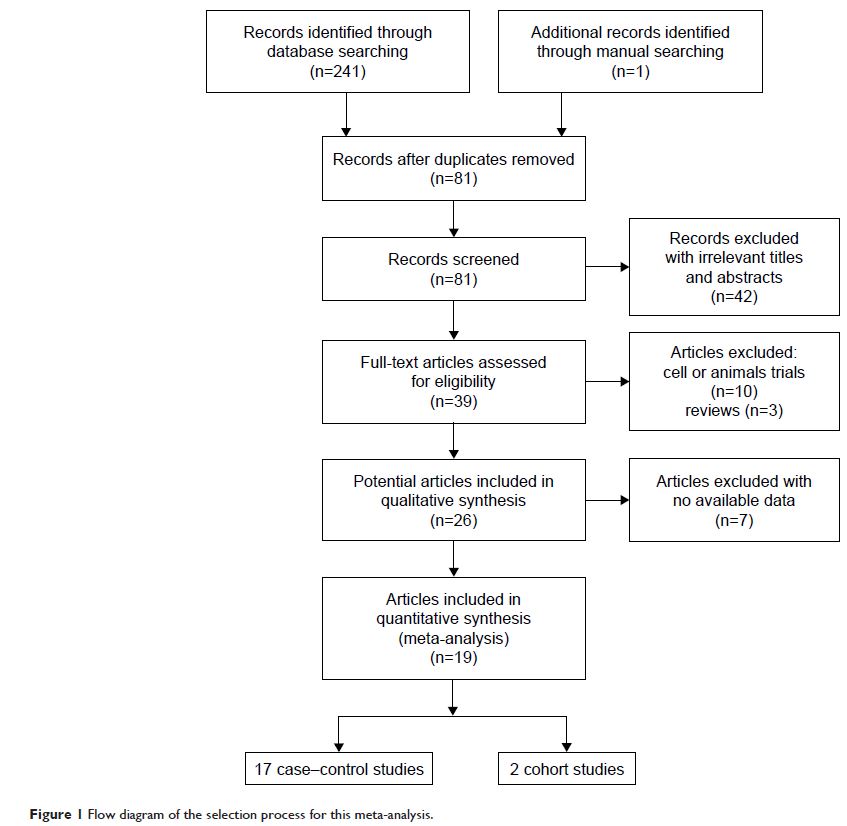108985
论文已发表
注册即可获取德孚的最新动态
IF 收录期刊
- 3.4 Breast Cancer (Dove Med Press)
- 3.2 Clin Epidemiol
- 2.6 Cancer Manag Res
- 2.9 Infect Drug Resist
- 3.7 Clin Interv Aging
- 5.1 Drug Des Dev Ther
- 3.1 Int J Chronic Obstr
- 6.6 Int J Nanomed
- 2.6 Int J Women's Health
- 2.9 Neuropsych Dis Treat
- 2.8 OncoTargets Ther
- 2.0 Patient Prefer Adher
- 2.2 Ther Clin Risk Manag
- 2.5 J Pain Res
- 3.0 Diabet Metab Synd Ob
- 3.2 Psychol Res Behav Ma
- 3.4 Nat Sci Sleep
- 1.8 Pharmgenomics Pers Med
- 2.0 Risk Manag Healthc Policy
- 4.1 J Inflamm Res
- 2.0 Int J Gen Med
- 3.4 J Hepatocell Carcinoma
- 3.0 J Asthma Allergy
- 2.2 Clin Cosmet Investig Dermatol
- 2.4 J Multidiscip Healthc

MLH1 甲基化在食管癌发生中的作用及其临床意义
Authors Li J, Ye D, Wang L, Peng Y, Li Q, Deng H, Zhou C
Received 24 October 2017
Accepted for publication 15 November 2017
Published 1 February 2018 Volume 2018:11 Pages 651—663
DOI https://doi.org/10.2147/OTT.S154999
Checked for plagiarism Yes
Review by Single-blind
Peer reviewers approved by Dr Manfred Beleut
Peer reviewer comments 2
Editor who approved publication: Dr William Cho
Abstract: The mutL homolog-1 (MLH1 ) is a DNA mismatch repair
gene and has been reported to be frequently methylated in numerous cancers.
However, the association between MLH1 methylation
and esophageal cancer (EC), as well as its clinical significance, remains
unclear. Hence, we conducted a systematic meta-analysis based on 19 articles
(including 1384 ECs, 345 premalignant lesions, and 1244 healthy controls). Our
analysis revealed that the frequency of MLH1 methylation
was significantly elevated during EC carcinogenesis. In addition, we observed
that MLH1 promoter methylation was
associated with age (odds ratio [OR]=1.79; 95% CI =1.20–2.66), advanced tumor
grade (OR=3.7; 95% CI =2.37–5.77), lymph node metastasis (OR=2.65; 95% CI
=1.81–3.88), distant metastasis (OR=7.60; 95% CI =1.23–47.19), advanced
clinical stage (OR=4.46; 95% CI =2.88–6.91), and poor prognosis in EC patients
(hazard ratio =1.64, 95% CI =1.00–2.69). The pooled sensitivity, specificity,
and area under the curve of MLH1 methylation
in EC patients versus healthy individuals were 0.15, 0.99, and 0.77,
respectively. Our findings indicate that MLH1 methylation
is involved in the carcinogenesis, progression, and metastasis of EC. Moreover,
methylated MLH1 could be a potential
diagnostic and prognostic biomarker for EC.
Keywords: MLH1 , methylation, esophageal
cancer, carcinogenesis, diagnosis, prognosis
